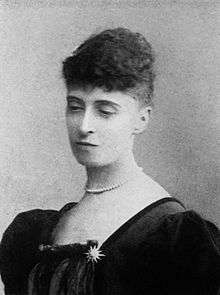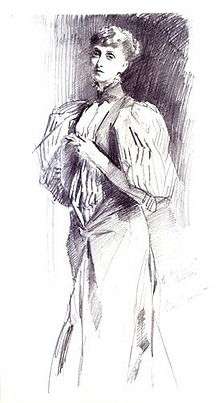Alice Meynell



Alice Christiana Gertrude Meynell (née Thompson; 11 October 1847[2] – 27 November 1922[3]) was an English writer, editor, critic, and suffragist, now remembered mainly as a poet.
Early years
Alice Christiana Gertrude Thompson was born in Barnes, London, to Thomas James and Christiana (née Weller) Thompson. The family moved around England, Switzerland, and France, but she was brought up mostly in Italy, where a daughter of Thomas from his first marriage had settled. Her father was a friend of Charles Dickens,[2] and Meynell suggests in her memoir that Dickens was also romantically interested in her mother, noting that he had said to Thomas Thompson, "Good God, what a madman I should seem if the incredible feeling I have conceived for that girl could be made plain to anyone!"[4]
Career
Preludes (1875) was her first poetry collection, illustrated by her elder sister Elizabeth (the artist Lady Elizabeth Butler, 1846–1933, whose husband was Sir William Francis Butler). The work was warmly praised by Ruskin, although it received little public notice. Ruskin especially singled out the sonnet "Renunciation" for its beauty and delicacy.[5]
After Alice, the entire Thompson family converted to the Catholic Church (1868 to 1880),[6] and her writings migrated to subjects of religious matters. This eventually led her to the Catholic newspaper publisher and editor Wilfrid Meynell (1852–1948) in 1876. A year later (in 1877) she married Meynell, and they settled in Kensington. They became the proprietors and editors of such magazines as The Pen, the Weekly Register, and Merry England, among others.[7]
Alice and Wilfrid Meynell had eight children, Sebastian, Monica, Everard (1882–1926), Madeleine, Viola, Vivian (who died at three months), Olivia, and Francis. Viola Meynell (1885–1956) became a writer, known mainly for fiction, and the youngest child Francis Meynell (1891–1975) became a poet and a printer who co-founded The Nonesuch Press.[7]
She was much involved in editorial work on publications with her husband, and in her own writing, poetry and prose. She wrote regularly for The World, The Spectator, The Magazine of Art, the Scots Observer (which became the National Observer, both edited by W. E. Henley), The Tablet, The Art Journal, the Pall Mall Gazette, and The Saturday Review.
The poet Francis Thompson, down and out in London and trying to recover from his opium addiction, sent the couple a manuscript. His poems were first published in Wilfrid's Merry England, and the Meynells became a supporter of Thompson. His 1893 book Poems was a Meynell production and initiative. Another supporter of Thompson was the poet Coventry Patmore. Alice had a deep friendship with Patmore, lasting several years, which led to his becoming obsessed with her, forcing her to break with him.[8]
At the end of the 19th century, in conjunction with uprisings against the British (among them the Indians', the Zulus', the Boxer Rebellion, and the Muslim revolt led by Muhammad Ahmed in the Sudan), many European scholars, writers, and artists, began to question Europe's colonial imperialism. This led the Meynells and others in their circle to speak out for the oppressed. Alice Meynell was a vice-president of the Women Writers' Suffrage League, founded by Cicely Hamilton and active 1908–19.[9]
Death and legacy
After a series of illnesses, including migraine and depression, she died 27 November 1922. She is buried at Kensal Green Catholic Cemetery in London. There is a London County Council commemorative blue plaque on the front wall of the property at 47 Palace Court, Bayswater, London, W2, where she and her husband once lived.
Selected works
- Preludes (1875) – poems
- The Rhythm of Life (1893) – essays
- Poems by Francis Thompson (1893) – editor and producer
- Holman Hunt (1893)
- Selected Poems of Thomas Gordon Hake (1894) – editor
- The Color of Life and other Essays (1896)
- Poetry of Pathos and Delight by Coventry Patmore (1896) – editor
- The Flower of the Mind (1897) – anthology of English verse, editor, critic
- The Children (1897) – essays
- The Spirit of Place (1898) – essays
- London Impressions (1898)
- Ruskin (1900)
- Later Poems (1901)
- The Work of John S. Sargent (1903)
- Ceres' Runaway and Other Essays (1909)
- Essays (1914)
- The Second Person Singular (1921)
- The Poems of Alice Meynell, Complete Edition (Oxford University Press, 1940)
- Prose and Poetry (Jonathan Cape, 1947) – multiple editors, centenary publication with a biography and critical introduction by Vita Sackville-West
The latter publication is catalogued by one WorldCat library as Prose and Poetry of A. Meynell, 1847–1922 (OCLC 219753450) and by one as Alice Meynell: Prose and Poetry. Centenary Volume (OCLC 57050918), while another reports a 2007 facsimile edition Prose and Poetry, 1847–1922. There may be the title of a 1970 issue as Prose and Poetry, OCLC 630445893.
See also
References
- ↑ "Alice Meynell (née Thompson)". National Portrait Gallery, London (npg.org.uk).
- 1 2 Badeni 1981, p. 1.
- ↑ Badeni 1981, p. 250.
- ↑ "Alice Meynell, a Memoir". C. Scribner's Sons. 1929. Retrieved 26 February 2016 – via Questia.
- ↑ Badeni 1981, pp. 52–55.
- ↑ Badeni 1981, p. 35.
- 1 2 Badeni 1981, pp. 50–116.
- ↑ Badeni 1981, pp. 115–129.
- ↑ Crawford, Elizabeth (2000). The Women's Suffrage Movement: A Reference Guide 1866–1929. London: Routledge, p. 712. ISBN 978-0415239264
Citations
- Badeni, June (1981). The slender tree : a life of Alice Meynell. Padstow, Cornwall: Tabb House. ISBN 0-907018-01-7.
External links
- "The Poems of Alice Meynell (1923)" at Poetry.elcore.net
- Essays by Alice Meynell at Quotidiana.org
- Works by Alice Meynell at Project Gutenberg
- Works by or about Alice Meynell at Internet Archive
- Works by Alice Meynell at LibriVox (public domain audiobooks)

- "Alice Meynell: Poet of Poets, 1847–1922" at the University of Virginia
- Index entry at Poets' Corner
- "Archival material relating to Alice Meynell". UK National Archives.



- Mahar, Aileen R (1946). Contemporary criticism, personal and literary, of Alice Meynell (Master's thesis). Boston University. Retrieved 1 March 2017.
- Alice Meynell collection at Boston College
- Alice Meynell at Library of Congress Authorities, with 67 catalog records
- Everard Meynell (son) at LC Authorities, with 4 records including that of The Life of Francis Thompson (1913)